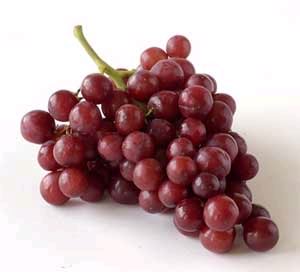Grapes are good for you.
Grape is one of the oldest fruits to be cultivated going back as far as biblical times. The more natural, the better. Raw fruits are better than cooked ones. Red grape juice and red wine contain a significant amount of flavonoids and red anthocyanin pigments that act as antioxidants. These substances protect cholesterol from oxidation, reduce blood lipid levels and inhibit the formation of blood clot, and provide protection against heart disease..
Grapes and grape juice, especially the purple and red grapes, contain resveratrol. Resveratrol has strong antioxidant and anti-inflammatory properties, and added benefits of dietary fiber. These antioxidants are found mainly in the skin, stem, leaf and seeds of grapes, rather than in the pulp of the grapes. Grapes are one of the most delicious fruits. They are a rich source of vitamins A, C, B6 and folate in addition to essential minerals like potassium, calcium, iron, phosphorus, magnesium and selenium. Studies done showed that antioxidants has prevented the kind of damage that can trigger the cancer process in cells.
Some other health benefits of grapes include the ability to treat asthma, micraine, constipation, indigestion, and has anti-cancer properties. Grapes are found to have strong anti-cancer properties due to the anti-inflammatory effect of resveratrol present in grapes. It is particularly effective in colorectal cancer and breast cancer. Anthocyanins and proanthocyanidins present in grapes have properties of an anti-proliferate and can inhibit the growth of cancer causing agents. Grape juice not only just prevents the risk of cancer, but also suppresses the growth and propagation of cancer cells. The pigments contained in grapes enhance the overall immunity of the body.
There is not enough evidence to say that eating grapes or drinking grape juice or wine can prevent or treat cancer.
Some research studies suggest that red and purple grape juices may provide the following heart health benefits as red wine. (better to eat the grapes.)
- Reducing the risk of blood clots
- Reducing low-density lipoprotein (LDL, or “bad”) cholesterol
- Preventing damage to blood vessels in your heart
- Helping maintain a healthy blood pressure



Source: Vibrant Life Magazine. CDC, Natural Remedies Encyclopedia. National Cancer Institute, Mayo Clinic, The Journal of Nutrition


Pingback: Natural Remedies Encyclopedia (America’s Master Book of Home Remedies) | naturalhealing4u.com()